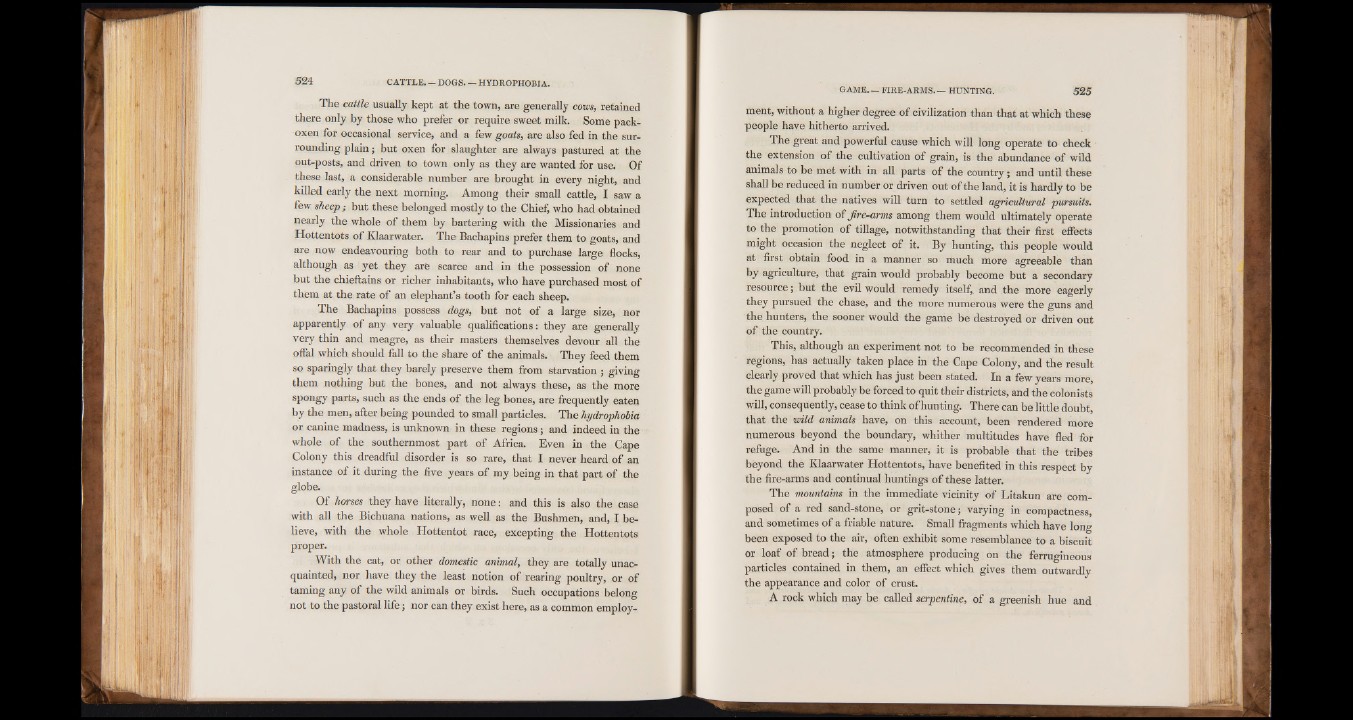
The cattle usually kept at the town, are generally cows, retained
there only by those who prefer or require sweet milk. Some pack-
oxen for occasional service, and a few goats, are also fed in the surrounding
plain; but oxen for slaughter are always pastured at the
out-posts, and driven to town only as they are wanted for use. Of
these last, a considerable number are brought in every night, and
killed early the next morning. Among their small cattle, I saw a
few sheep; but these belonged mostly to the Chief, who had obtained
nearly the whole of them by bartering with the Missionaries and
Hottentots of Klaarwater. The Bachapins prefer them to goats, and
are now endeavouring both to rear and to purchase large flocks,
although as yet they are scarce and in the possession of none
but the chieftains or richer inhabitants, who have purchased most of
them at the rate of an elephant’s tooth for each sheep.
The Bachapins possess dogs, but not of a large size, nor
apparently of any very valuable qualifications: they are generally
very thin and meagre, as their masters themselves devour all the
offal which should fall to the share of the animals. They feed them
so sparingly that they barely preserve them from starvation ; giving
them nothing but the bones, and not always these, as the more
spongy parts, such as the ends of the leg bones, are frequently eaten
by the men, after being pounded to small particles. The hydrophobia
or canine madness, is unknown in these regions; and indeed in the
whole of the southernmost part of Africa. Even in the Cape
Colony this dreadful disorder is so rare, that I never heard of an
instance of it during the five years of my being in that part of the
globe.O
f horses they have literally, none: and this is also the case
with all the Bichuana nations, as well as the Bushmen, and, I believe,
with the whole Hottentot race, excepting the Hottentots
proper.
With the cat, or other domestic animal, they are totally unacquainted,
nor have they the least notion of rearing poultry, or of
taming any of the wild animals or birds. Such occupations belong
not to the pastoral life; nor can they exist here, as a common employment,
without a higher degree of civilization than that at which these
people have hitherto arrived.
The great and powerful cause which will long operate to check
the extension of the cultivation of grain, is the abundance of wild
animals to be met with in all parts of the country; and until these
shall be reduced in number or driven out of the land, it is hardly to be
expected that the natives will turn to settled agricultural pursuits.
The introduction of fire-arms among them would ultimately operate
to the promotion of tillage, notwithstanding that their first effects
might occasion the neglect of it. By hunting, this people would
at first obtain food in a manner so much more agreeable than
by agriculture, that grain would probably become but a secondary
resource; but the evil would remedy itself, and the more eagerly
they pursued the chase, and the more numerous were the guns and
the hunters, the sooner would the game be destroyed or driven out
of the country.
This, although an experiment not to be recommended in these
regions, has actually taken place in the Cape Colony, and the result
clearly proved that which has just been stated. In a few years more,
the game will probably be forced to quit their districts, and the colonists
will, consequently, cease to think of hunting. There can be little doubt,
that the wild animals have, on this account, been rendered more
numerous beyond the boundary, whither multitudes have fled for
refuge. And in the same manner, it is probable that the tribes
beyond the Klaarwater Hottentots, have benefited in this respect by
the fire-arms and continual huntings of these latter.
The mountains in the immediate vicinity of Litakun are composed
of a red sand-stone, or grit-stone; varying in compactness,
and sometimes of a friable nature. Small fragments which have long
been exposed to the air, often exhibit some resemblance to a biscuit
or loaf of bread; the atmosphere producing on the ferrugineous
particles contained in them, an effect which gives them outwardly
the appearance and color of crust.
A rock which may be called serpentine, of a greenish hue and